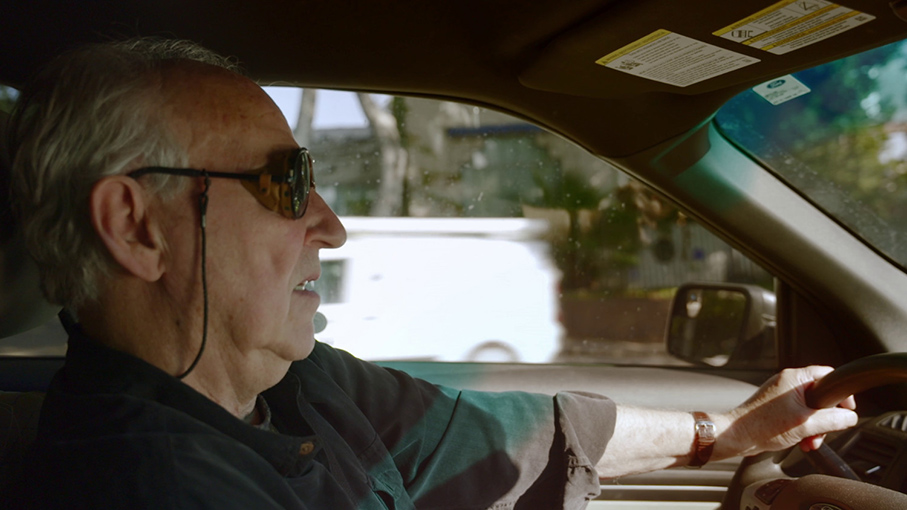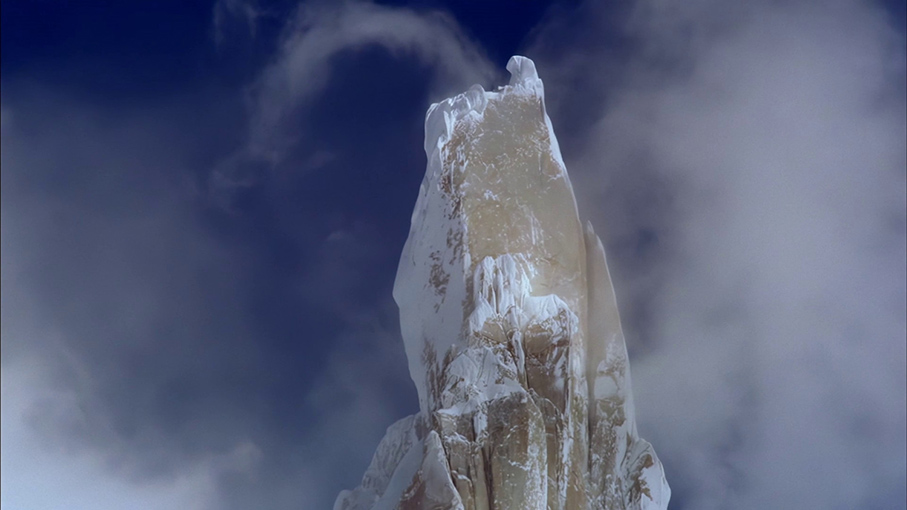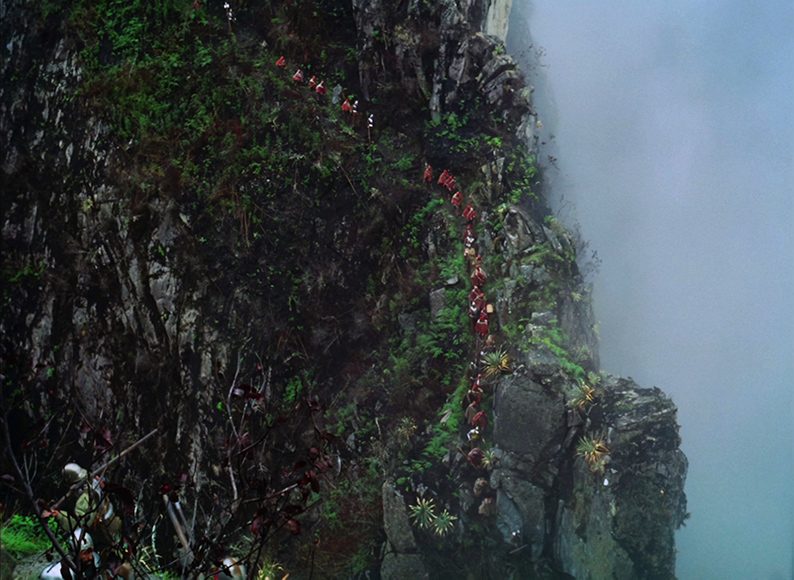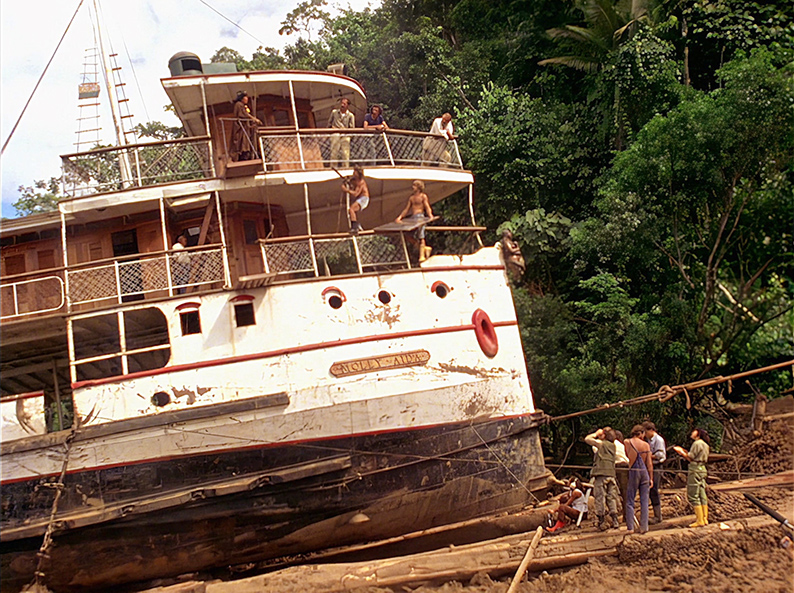"I do not dream. Very, very rarely. I always feel it as a void, something that was missing. But I do have an equivalent of dreams when I'm walking, for example. Or sometimes when I'm driving very long distances, when I'm over twenty hours in the car, all of a sudden, the car fills with insects and butterflies that are crowding around. My existence has a meaning when I'm trying to do a story where now it is deep inside all of us, and there are certain things I recognise as being inside us but they have not been articulated yet. And that's, for me, an equivalent to dream."
Thus Werner Herzog, driving through his adopted home of Los Angeles while speaking to camera, while the opening credits appear on screen. And thus the thesis of Thomas von Steinaecker's documentary.
Born in 1942 in Munich, Werner Herzog could be said to be his own invention. Of the directors who came of age as part of the New German Cinema of the late 1960s into the 1970s, some have vanished into obscurity (Alexander Kluge, still alive as I write this, whose 1965 film Yesterday Girl (Abschied von gestern) is excerpted here – not a film I'm aware of ever having had any chance to see), or are no longer with us (for example Rainer Werner Fassbinder). Others, like Wim Wenders and Volker Schlöndorff, both interviewed here, are still active or at least have been in the last seven years, but it's fair to say that Herzog has the highest profile of them all. That's not just for his films, with his fiction features being less prominent compared to some of his documentaries in the last few decades, but for his persona. There's the name – his birth surname was Stipetić, a name still borne by his younger half-brother and frequent producer Lucki. There's the accent, which I'm reliably told is unlike any other Bavarian's. This has enabled several acting gigs in other's films and television productions, such as The Simpsons (more than once), The Mandalorian and Jack Reacher, enabling him to steal any scene not nailed down. And there are the stories, of the making of his films (of which more later) but elsewhere, and we see clips of some of those: him being shot by an air rifle while being interviewed by Mark Kermode, and the result of losing a bet, filmed by Les Blank under the self-explanatory title of Werner Herzog Eats His Shoe. And there are the films themselves, a good sampling (eighteen of them) available in a BFI box set I'd fully recommend.

Herzog has made both documentaries and fiction films throughout his career, and you could say that the two forms intertwine. In his non-fiction, he's quite capable of using fiction techniques, such as staging scenes for the camera or overlaying rapturous slo-mo of the subject of The Great Ecstasy of Woodcarver Steiner (Die große Ekstase des Bildschnitzers Steiner, 1974), a ski-jumper, overlaid by music from regular collaborators Popul Vuh. On the other hand, there is a clear documentary impulse in his fictional work. Where filmmakers today might well use CGI, he does it for real so in ways his films become documentaries of their own making. Yes, he somehow persuaded hundreds of natives into a procession down a mountainside in the opening scene of Aguirre, The Wrath of God (Aguirre, der Zorn Gottes, 1972). Yes, he emulated his protagonist by dragging a steamship over an Amazonian hillside in Fitzcarraldo (1982), and in that case there is also a documentary of that documentary impulse, Les Blank's Burden of Dreams (also 1982), which won a British Academy Award for Best Documentary and is included in the BFI box set mentioned above. Add to that populating an entire film with a cast of little people, Even Dwarfs Started Small (Auch Zwerge haben klein angefangen, 1970) and putting almost his entire cast under hypnosis to make Heart of Glass (Herz aus Glas, 1976). In whichever mode he was working in, Herzog's films have an imaginative avarice for the remoter parts of the world – not just the South American jungles or the Australian outback (Where the Green Ants Dream, 1984) but also small-town USA (Stroszek, 1977). Typically Herzog and his cinematographers (often Jörg Schmidt-Reitwein or Thomas Mauch, the latter interviewed here) would shoot in what is either natural light or what looks very much like it. The results are frequently sublime, in the sense of a transmuted awe, fear and terror rather than the merely beautiful.
In both modes, Herzog is fascinated by experiences outside of the majority of human experience, of what could be called ecstatic states – particularly referenced in the title of the Steiner documentary. That would include the deaf-blind people at the centre of his documentary Land of Silence and Darkness (Land des Schweigens und der Dunkelheit, 1971) and the protagonists of many of his dramatic features, such as Aguirre leading an expedition descending into madness and Fitzcarraldo's obsession with building an opera house in the Amazonian jungle. While he portrays these seekers and visionaries with considerable empathy, he doesn't always do so uncritically. In what is probably his best-known recent documentary, Grizzly Man (2005), Timothy Treadwell's connection with nature is seen to be naïve, sentimental and ultimately fatal.
And there are also his collaborations with particular actors, such as Bruno S. (The Enigma of Kaspar Hauser (Jeder für sich und Gott gegen alle, 1974) and Stroszek) and especially the five films he made with Klaus Kinski. Herzog documented his tumultuous relationship with the latter – whose intensity as an actor was matched by his distinctly unstable and often despicable behaviour – in the 1999 film My Best Fiend.

All this and more is covered in Radical Dreamer, which takes a standard form: an introduction, with interviews with the man himself, plus testimonials from fellow filmmakers (the aforementioned Wenders and Schlöndorff but also Chloé Zhao and Joshua Oppenheimer), relatives (his present wife Lena and one former wife Maartje Grohmann, two brothers, Lucki Stipetić and Tilbert Herzog) and actors who have worked with him, including Nicole Kidman, Robert Pattinson and the recently deceased Carl Weathers and celebrity fan Patti Smith, who saw Aguirre on release. (She also performs a song during the closing credits.) There are plenty of extracts from Herzog's films, respecting aspect ratios. (For a filmmaker prone to big-screen spectacle, his films are often "portrait" rather than "landscape" – indeed his first four features, including Aguirre, are in Academy Ratio.) There's a sense that all of this is too much for one film of ninety minutes to cover, and it's not something that Radical Dreamer manages. As an entry-level introduction to Herzog's work, it certainly works, and the anecdotes and interviews are entertaining, but you wonder if you might learn more by watching the films themselves.
Werner Herzog: Radical Dreamer is a Blu-ray release from the BFI, a single disc encoded for Region B only. The documentary has a 15 certificate and the short The Colonist a U.
The main feature is presented in a ratio of 1.78:1 which is no doubt what it was presented in cinemas at and no doubt reflects its television funding (ZDF and ARTE). That is also the likely reason why this transfer plays at twenty-five frames per second rather than the usual cinematic speed of twenty-four. The new material was digitally captured while the extracts from Herzog's films plus some stock footage (mostly originally shot in 35mm or 16mm) as mentioned above respect their original aspect ratios. This isn't the most visually distinguished of films, as it's shot in a fairly neutral style, so as better to showcase some striking sequences that Herzog himself made, but I'm in no doubt that it looks as it should do.
The soundtrack comes with two options, DTS-HD MA 5.1 and LPCM 2.0, the latter playing in surround. There's very little difference between the two, so the choice is yours: not much surround activity, mostly used for Philip Stegers's music score. Most of Herzog's films we see extracts from have mono soundtracks anyway.

There are two subtitle streams for the main feature only. The default has fixed subtitles for the parts where interviewees such as Wenders, Schlöndorff and Herzog's brothers speak in German and for extracts from Herzog's German-language films. An optional hard-of-hearing track has these subtitles and also those for the rest of the film.
Additional interviews (15:38)
Some extra material that was edited out of the feature. With one exception, the interviewees all appear in the main feature: Schlöndorff, Zhao, Wenders, Weathers. The exception is Eva Mattes, who worked with Herzog on Stroszek and Woyzeck, though a clip from the latter film, her final scene (no spoilers), does appear. Generally you can see why these were edited out, though Wenders makes an interesting comparison between Herzog and a German filmmaker from a previous generation, F.W. Murnau, who had like Herzog moved to Hollywood and worked and died there. Wenders suggests that Murnau's Tabu is a film Herzog could have made, and I'm inclined to agree. Partway through this item, the interviews change from 1.78:1 to 1.33:1 and some people are billed as being "im Gespräch" (in conversation – the captions are all in German): all the above plus Christian Bale, Nicole Kidman and Robert Pattinson.
The Colonist (9:36)
This is a short film from 2022 made by Welsh filmmaker Robert A. Smith, under the mentorship of Werner Herzog (as the opening credits put it). Smith was on Herzog's Accelerator Programme in Lanzarote, with the theme of the workshop being "filming a strange planet". That certainly describes the result, as a man (Bradley Joshua Ibrahim) wanders the wilderness in search of meaning. I was reminded of Herzog's non-narrative feature (not really a documentary) Fata Morgana, and Lanzarote was also the location of Herzog's Even Dwarfs Started Small. Other than voiceover, there is some nice Gregorian chant on the soundtrack.
Poster Gallery (2:20)
A self-navigating look at posters – mostly German ones – for Herzog's feature films, from his first, Signs of Life (Lebenszeichen, 1968) up to 2016's Salt and Fire.
Trailer (2:21)
An effective summation of the feature, including some spectacular landscape shots. It does tell you what you're going to get. Presented in a choice of DTS-HD MA 5.1 and Dolby Digital 2.0, but as with the main feature there's little difference except that the latter is mixed louder.

Booklet
Available with the first pressing only, the BFI's booklet runs to twenty-four pages. Geoff Andrew begins with questioning the very title of the film: "Werner Herzog: Radical Dreamer...or What?" He also says that most of the interviewees aren't especially illuminating, with Wenders being the most so, which I would agree with. Andrew suggests that the stories and myths surrounding Herzog and his eccentricities feed into a "romantic notion of creative wizardry", in which he compares Herzog to David Lynch. However, he then goes on to provide an appreciation of the man a little at odds with the film this booklet accompanies, with Herzog a seeker after what he calls "the ecstatic truth" (as opposed to the literal "accountant's truth") and, for all the questions which could be asked, someone who has created some very great cinema.
After a credits listing for the main feature, we have "The Many Faces of Werner Herzog" by Kristina Jespers, translated by Corinna Reicher. Jespers is a curator at the Deutsche Kinemathek, which put on an exhibition with a catalogue for Herzog's eightieth birthday (the URLs in the article no longer work). She talks about Herzog's archive in Berlin, which was the source for many of the stills and documents featured in Radical Dreamer. She ends with a brief description of the "ecstatic truth" which motivates much of Herzog's work.
Also in the booklet are credits for and notes on the extras, including a piece by Robert A. Smith on The Colonist.
Radical Dreamer is a useful primer for Werner Herzog's work, but you suspect anyone already familiar with it won't discover much new, and inevitably for a man with such a large filmography and only ninety minutes at the filmmaker's disposal, parts of that work are elided or not mentioned at all. Entry-level it may be, but it's certainly well-presented on the BFI's Blu-ray.
|